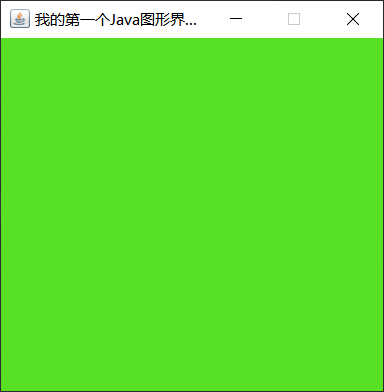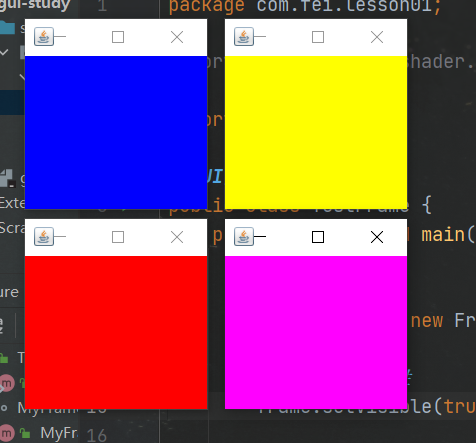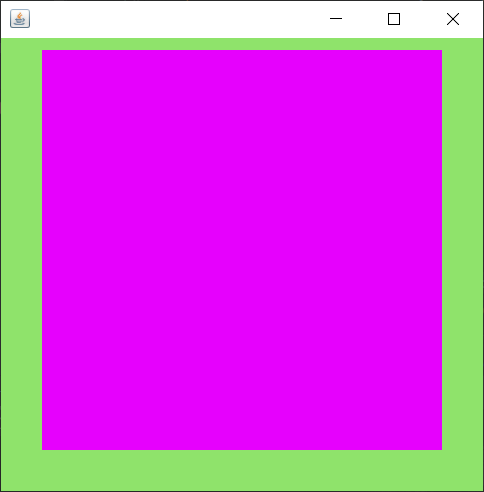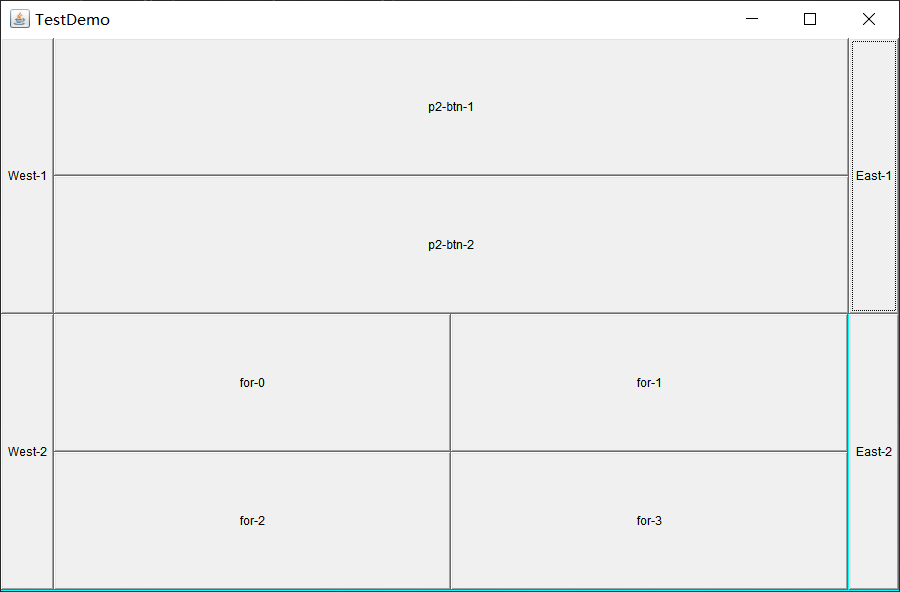GUI编程
简介
GUI的核心技术: Swing AWT
- 因为界面不美观
- 需要jre环境!
为什么要学习?
- 可以写出自己心中想要的一些小工具
- 工作的时候,也可能需要维护到Swing界面,概率极小!
- 了解MVC框架,了解监听!
AWT
AWT介绍
- 包含了很多类的接口! GUI!
- 元素:窗口、按钮、文本框
- Java.awt
组件和容器
frame
package com.fei.lesson01;
import com.sun.prism.shader.FillCircle_RadialGradient_PAD_AlphaTest_Loader;
import java.awt.*;
//GUI的第一个界面
public class TestFrame {
public static void main(String[] args) {
//Frame
Frame frame = new Frame("我的第一个Java图形界面窗口");
//需要设置可见性
frame.setVisible(true);
//设置窗口大小
frame.setSize(400, 400);
//设置背景颜色
frame.setBackground(new Color(87, 224, 38));
//弹出的初始位置
frame.setLocation(200 , 200);
//设置大小固定
frame.setResizable(false);
}
}

问题:发现窗口关闭不掉,需要停止运行程序
尝试回顾封装
package com.fei.lesson01;
import java.awt.*;
public class TestFrame02 {
public static void main(String[] args) {
//展示多个窗口 new
MyFrame myFrame = new MyFrame(100, 100, 200, 200, Color.BLUE);
MyFrame myFrame1 = new MyFrame(300, 100, 200, 200, Color.yellow);
MyFrame myFrame2 = new MyFrame(100, 300, 200, 200, Color.red);
MyFrame myFrame3 = new MyFrame(300, 300, 200, 200, Color.magenta);
}
}
class MyFrame extends Frame{
static int id = 0; //可能存在多个窗口,我们需要一个计数器
public MyFrame(int x , int y, int w, int h, Color color){
super("MyFrame" + (++id));
setBackground(color);
setBounds(x , y, w, h);
setVisible(true);
}
}

面板panel
解决了关闭事件
package com.fei.lesson02;
import java.awt.*;
import java.awt.event.WindowAdapter;
import java.awt.event.WindowEvent;
//Panel 可以看成是一个空间,但不鞥单独存在
public class TestPanel {
public static void main(String[] args) {
Frame frame = new Frame();
//布局的概念
Panel panel = new Panel();
//设置布局
frame.setLayout(null);
//坐标
frame.setBounds(300, 300, 500, 500);
frame.setBackground(new Color(0x8FE36B));
// Panel 设置坐标,相对于frame
panel.setBounds(50, 50, 400, 400);
panel.setBackground(new Color(230,1, 253));
//frame.add(panel)
frame.add(panel);
frame.setVisible(true);
//监听事件,监听窗口关闭事件 System.exit(0)
frame.addWindowListener(new WindowAdapter() {
//窗口点击关闭之后需要做的事情
@Override
public void windowClosing(WindowEvent e) {
System.exit(0);
}
});
}
}

布局管理器
- 流式布局
package com.fei.lesson03;
import java.awt.*;
import java.awt.event.WindowAdapter;
import java.awt.event.WindowEvent;
public class TestFlowLayout {
public static void main(String[] args) {
Frame frame = new Frame();
//组件 -- 按钮
Button button1 = new Button("button1");
Button button2 = new Button("button2");
Button button3 = new Button("button3");
//设置为流式布局
frame.setLayout(new FlowLayout(FlowLayout.LEFT));
frame.setSize(200, 200);
//把按钮添加上去
frame.add(button1);
frame.add(button2);
frame.add(button3);
frame.setVisible(true);
frame.addWindowListener(new WindowAdapter() {
@Override
public void windowClosing(WindowEvent e) {
System.exit(0);
}
});
}
}
- 东西南北中
package com.fei.lesson03;
import java.awt.*;
import java.awt.event.WindowAdapter;
import java.awt.event.WindowEvent;
public class TestBorderLayout {
public static void main(String[] args) {
Frame frame = new Frame("TestBorderLayout");
Button east = new Button("East");
Button west = new Button("West");
Button north = new Button("North");
Button south = new Button("South");
Button center = new Button("Center");
frame.add(east, BorderLayout.EAST);
frame.add(west, BorderLayout.WEST);
frame.add(north, BorderLayout.NORTH);
frame.add(south, BorderLayout.SOUTH);
frame.add(center, BorderLayout.CENTER);
frame.setSize(300 , 300);
frame.setVisible(true);
frame.addWindowListener(new WindowAdapter() {
@Override
public void windowClosing(WindowEvent e) {
System.exit(0);
}
});
}
}
- 表格布局
package com.fei.lesson03;
import java.awt.*;
import java.awt.event.WindowAdapter;
import java.awt.event.WindowEvent;
public class TestGridLayout {
public static void main(String[] args) {
Frame frame = new Frame("TestGridLayout");
Button tian = new Button("tian");
Button nan = new Button("nan");
Button di = new Button("di");
Button bei = new Button("bei");
Button zhong = new Button("zhong");
frame.setLayout(new GridLayout(3 ,2));
frame.add(tian);
frame.add(nan);
frame.add(di);
frame.add(bei);
frame.add(zhong);
frame.pack(); //java函数
frame.setVisible(true);
frame.addWindowListener(new WindowAdapter() {
@Override
public void windowClosing(WindowEvent e) {
System.exit(0);
}
});
}
}
课堂练习
package com.fei.lesson03;
import java.awt.*;
import java.awt.event.WindowAdapter;
import java.awt.event.WindowEvent;
public class TestDemo {
public static void main(String[] args) {
Frame frame = new Frame("TestDemo");
frame.setSize(500 , 600);
frame.setLocation(400, 400);
frame.setBackground(Color.CYAN);
frame.setVisible(true);
frame.setLayout(new GridLayout(2,1));
//4个面板
Panel p1 = new Panel(new BorderLayout());
Panel p2 = new Panel(new GridLayout(2, 1));
Panel p3 = new Panel(new BorderLayout());
Panel p4 = new Panel(new GridLayout(2, 2));
//上面
p1.add(new Button("East-1"), BorderLayout.EAST);
p1.add(new Button("West-1"), BorderLayout.WEST);
p2.add(new Button("p2-btn-1"));
p2.add(new Button("p2-btn-2"));
p1.add(p2, BorderLayout.CENTER);
//下面
p3.add(new Button("East-2"), BorderLayout.EAST);
p3.add(new Button("West-2"), BorderLayout.WEST);
//中间的4个
for (int i = 0; i < 4; i++) {
p4.add(new Button("for-" + i));
}
p3.add(p4, BorderLayout.CENTER);
frame.add(p1);
frame.add(p3);
frame.addWindowListener(new WindowAdapter() {
@Override
public void windowClosing(WindowEvent e) {
System.exit(0);
}
});
}
}

总结
1. Frame是一个顶级窗口
2. Panel无法单独显示,必须添加到某个容器中
3. 布局管理器
1. 流式
2. 东西南北中
3. 表格
4. 大小、定位、背景颜色、可见性、监听!
事件监听
事件监听:当某个事情发生 的时候,鼠标、键盘------ 干什么?
package com.fei.lesson04;
import java.awt.*;
import java.awt.event.ActionEvent;
import java.awt.event.ActionListener;
import java.awt.event.WindowAdapter;
import java.awt.event.WindowEvent;
public class TestAction {
public static void main(String[] args) {
//按下按钮, 触发一些事件
Frame frame = new Frame();
Button button = new Button();
frame.add(button, BorderLayout.CENTER);
frame.pack();
windowClose(frame);
frame.setVisible(true);
//因为addActionListener() 需要一个ActionListener,所以我们需要构造一个ActionListener
MyActionListener myActionListener = new MyActionListener();
button.addActionListener(myActionListener);
}
//关闭窗体的事件
private static void windowClose(Frame frame) {
frame.addWindowListener(new WindowAdapter() {
@Override
public void windowClosing(WindowEvent e) {
System.exit(0);
}
});
}
}
//事件监听
class MyActionListener implements ActionListener{
@Override
public void actionPerformed(ActionEvent e) {
System.out.println("wangpengfei");
}
}
输入框TextField 监听
package com.fei.lesson05;
import java.awt.*;
import java.awt.event.ActionEvent;
import java.awt.event.ActionListener;
public class TestText01 {
public static void main(String[] args) {
//只负责启动
new MyFrame();
}
}
class MyFrame extends Frame{
public MyFrame(){
TextField textField = new TextField();
add(textField);
//监听这个文本框输入的文字
MyActionListener myActionListener = new MyActionListener();
//按下 enter 就会触发这个输入框的事件
textField.addActionListener(myActionListener);
//设置替换编码
textField.setEchoChar('*');
setVisible(true);
pack();
}
}
class MyActionListener implements ActionListener{
@Override
public void actionPerformed(ActionEvent e) {
TextField field = (TextField) e.getSource(); //获得一些资源,返回了一个对象
System.out.println(field.getText()); //获得输入框的文本
field.setText("");
}
}
简易计算器、组合 + 内部类回顾复习
原始代码
package com.fei.lesson05;
import java.awt.*;
import java.awt.event.ActionEvent;
import java.awt.event.ActionListener;
//简易计算器
public class DemoText {
public static void main(String[] args) {
Calculator calculator = new Calculator();
}
}
//计算器类
class Calculator extends Frame{
public Calculator(){
//3个文本框
TextField num1 = new TextField(10);
TextField num2 = new TextField(10);
TextField num3 = new TextField(20);
//一个按钮
Button button = new Button("=");
button.addActionListener(new MyCalculatorListener(num1, num2, num3));
//1个标签
Label label = new Label("+");
//布局
setLayout(new FlowLayout());
add(num1);
add(label);
add(num2);
add(button);
add(num3);
pack();
setVisible(true);
}
}
//监听器类
class MyCalculatorListener implements ActionListener{
//获取三个变量
private TextField num1, num2 , num3;
public MyCalculatorListener(TextField num1, TextField num2, TextField num3) {
this.num1 = num1;
this.num2 = num2;
this.num3 = num3;
}
@Override
public void actionPerformed(ActionEvent e) {
//获得加数和被加数
int n1 = Integer.parseInt(num1.getText());
int n2 = Integer.parseInt(num2.getText());
//将这个值 + 法运算后,放到第三个框
num3.setText("" + (n1 + n2));
//清徐前两个框
num1.setText("");
num2.setText("");
}
}
完全面向对象
package com.fei.lesson05;
import java.awt.*;
import java.awt.event.ActionEvent;
import java.awt.event.ActionListener;
import java.awt.event.WindowAdapter;
import java.awt.event.WindowEvent;
//简易计算器
public class DemoText {
public static void main(String[] args) {
new Calculator().loadFrame();
}
}
//计算器类
class Calculator extends Frame {
//属性
TextField num1, num2, num3;
//方法
public void loadFrame() {
num1 = new TextField(10);
num2 = new TextField(10);
num3 = new TextField(20);
Button button = new Button("=");
Label label = new Label("+");
button.addActionListener(new MyCalculatorListener(this));
setLayout(new FlowLayout());
add(num1);
add(label);
add(num2);
add(button);
add(num3);
pack();
setVisible(true);
}
}
//监听器类
class MyCalculatorListener implements ActionListener {
//获取计算器这个对象,在一个类中组合另一个类
Calculator calculator = null;
public MyCalculatorListener(Calculator calculator) {
this.calculator = calculator;
}
@Override
public void actionPerformed(ActionEvent e) {
//获得加数和被加数
//将这个值 + 法运算后,放到第三个框
//清徐前两个框
int n1 = Integer.parseInt(calculator.num1.getText());
int n2 = Integer.parseInt(calculator.num2.getText());
calculator.num3.setText("" + (n1 + n2));
calculator.num1.setText("");
calculator.num2.setText("");
}
}
内部类
- 更好的包装
package com.fei.lesson05;
import java.awt.*;
import java.awt.event.ActionEvent;
import java.awt.event.ActionListener;
import java.awt.event.WindowAdapter;
import java.awt.event.WindowEvent;
//简易计算器
public class DemoText {
public static void main(String[] args) {
new Calculator().loadFrame();
}
}
//计算器类
class Calculator extends Frame {
//属性
TextField num1, num2, num3;
//方法
public void loadFrame() {
num1 = new TextField(10);
num2 = new TextField(10);
num3 = new TextField(20);
Button button = new Button("=");
Label label = new Label("+");
button.addActionListener(new MyCalculatorListener());
setLayout(new FlowLayout());
add(num1);
add(label);
add(num2);
add(button);
add(num3);
pack();
setVisible(true);
}
//监听器类
//内部类最大的好处,就是可以畅通无阻的访问外部类的属性和方法
private class MyCalculatorListener implements ActionListener {
@Override
public void actionPerformed(ActionEvent e) {
//获得加数和被加数
//将这个值 + 法运算后,放到第三个框
//清徐前两个框
int n1 = Integer.parseInt(num1.getText());
int n2 = Integer.parseInt(num2.getText());
num3.setText("" + (n1 + n2));
num1.setText("");
num2.setText("");
}
}
}
画笔paint
package com.fei.lesson06;
import java.awt.*;
public class TestPaint {
public static void main(String[] args) {
new MyPaint().losdFrame();
}
}
class MyPaint extends Frame{
public void losdFrame(){
setBounds(200,200,600,500);
setVisible(true);
}
//画笔
@Override
public void paint(Graphics g) {
// super.paint(g);
//画笔需要有颜色,可以画画
g.setColor(Color.red);
g.drawOval(100, 100, 100, 100);
g.fillOval(100, 100, 100,100); //画一个实心的圆
g.setColor(Color.GREEN);
g.fillRect(200, 200, 150, 150);
//养成习惯,画笔用完将它还原为最初的颜色,默认的是黑色
}
}
鼠标监听
目的:想要实现鼠标画画
窗口监听
package com.fei.lesson06;
import java.awt.*;
import java.awt.event.WindowAdapter;
import java.awt.event.WindowEvent;
public class TestWindow {
public static void main(String[] args) {
new WindowFrame();
}
}
class WindowFrame extends Frame {
public WindowFrame(){
setBackground(Color.blue);
setBounds(100, 100, 200, 200);
setVisible(true);
//addWindowListener(new MyWindowListener());
this.addWindowListener(
//匿名内部类
new WindowAdapter() {
@Override
public void windowOpened(WindowEvent e) {
System.out.println("窗口打开");
}
//关闭窗口
@Override
public void windowClosing(WindowEvent e) {
System.out.println("窗口关闭");
System.exit(0);
}
@Override
public void windowClosed(WindowEvent e) {
super.windowClosed(e);
}
@Override
public void windowIconified(WindowEvent e) {
System.out.println("窗口Activated");
}
@Override
public void windowDeiconified(WindowEvent e) {
super.windowDeiconified(e);
}
//激活窗口
@Override
public void windowActivated(WindowEvent e) {
super.windowActivated(e);
}
@Override
public void windowDeactivated(WindowEvent e) {
super.windowDeactivated(e);
}
@Override
public void windowStateChanged(WindowEvent e) {
super.windowStateChanged(e);
}
@Override
public void windowGainedFocus(WindowEvent e) {
super.windowGainedFocus(e);
}
@Override
public void windowLostFocus(WindowEvent e) {
super.windowLostFocus(e);
}
}
);
}
// class MyWindowListener extends WindowAdapter {
// @Override
// public void windowClosing(WindowEvent e) {
// setVisible(false);//隐藏窗口,通过按钮隐藏窗口
// System.exit(0); //正常退出
// }
// }
}
键盘监听
package com.fei.lesson06;
import java.awt.*;
import java.awt.event.KeyAdapter;
import java.awt.event.KeyEvent;
//键
public class TestKeyListener {
public static void main(String[] args) {
new KeyFrame();
}
}
class KeyFrame extends Frame {
public KeyFrame(){
setBounds(1, 2, 300, 400);
setVisible(true);
this.addKeyListener(new KeyAdapter() {
//键盘按下
@Override
public void keyPressed(KeyEvent e) {
//获得键盘按下的是哪一个键
int keyCode = e.getKeyCode();
if (keyCode == KeyEvent.VK_UP) {
System.out.println("你按下的是上键");
}
//根据按下的不同操作,产生的不同的结果
}
});
}
}
Swing
窗口
package com.fei.lesson07;
import javax.swing.*;
import java.awt.*;
import java.awt.event.ActionEvent;
//主窗口
public class DialogDemo extends JFrame {
public DialogDemo(){
this.setVisible(true);
this.setSize(700, 500);
this.setDefaultCloseOperation(WindowConstants.EXIT_ON_CLOSE);
//JFrame放东西,容器
Container container = this.getContentPane();
//绝对布局
container.setLayout(null);
//按钮
JButton button = new JButton("点击弹出一个对话框"); //创建
button.setBounds(30 ,30 ,200 ,50);
//点击这个按钮的时候弹出一个弹窗
button.addActionListener(new AbstractAction() { //监听器
@Override
public void actionPerformed(ActionEvent e) {
//弹窗
new MyDialogDemo();
}
});
container.add(button);
}
public static void main(String[] args) {
new DialogDemo();
}
}
//弹窗的窗口
class MyDialogDemo extends JDialog {
public MyDialogDemo() {
this.setVisible(true);
this.setBounds(100 ,100 ,500, 500);
// this.setDefaultCloseOperation(WindowConstants.EXIT_ON_CLOSE); //设置关闭默认的操作
Container contentPane = this.getContentPane();
contentPane.setLayout(null);
contentPane.add(new Label("飞哥努力学习Java"));
}
}
MVC模式指的是MVC框架,M指的是业务模型v是指用户界面,C是指控制器,使用MVC的目的是将M和V实现代码分离,从而使同一个程序可以使用不同的表现形式。其中View的定义比较清晰,就是用户界面



